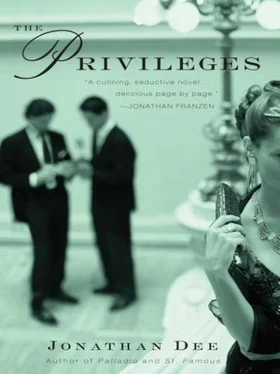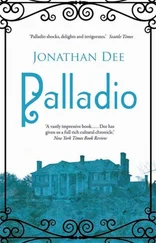It wasn’t really much of a bank; it looked more like a doctor’s office, with a heavy-lidded fat woman in a tight pink dress sitting at a receptionist’s desk and a closed door behind her with a security camera above it. The woman was not someone Adam had seen before.
“Mr. Bryant?” he asked her. Regally she looked him over and then stood and passed through the door behind her without a word. Adam looked up at the camera. In a few seconds she reappeared and beckoned him through, smiling now as she closed the door behind him.
Mr. Bryant rose from behind an old metal desk and shook Adam’s hand; behind him were two low metal filing cabinets, the paneled wall, and, through a narrow window, the blue marina. “Merry Christmas to you, Mr. Adam,” he said. “You have everything you need?” He meant at the villa. He had absolutely nothing to do with the villa or its operation, but he liked to ask. “You are enjoying yourself?”
“As always,” Adam said.
“Your family is well?”
“Very well. And yours?”
Mr. Bryant nodded in answer, or maybe he was just nodding approvingly at the question. They would never meet each other’s families, but the civilities could not be bypassed, as Adam had learned, when you dealt with Mr. Bryant. Now he unfolded his long-fingered hands, opened his desk drawer, and took out a collection of five checks, all for different amounts, all payable to cash, held together by a paper clip. He removed the paper clip and handed the checks to Adam. Adam looked them over, though not carefully; he folded them in half, put them in the pocket of his shorts, and rose to shake hands a second time.
“My friend says to expect him next around Easter,” Adam said.
“At your service. When do you fly home?”
“Tomorrow.”
Mr. Bryant clucked regretfully. “You’ll miss the regatta,” he said. “Oh well. Duty calls, I am sure.” They shook hands yet again, warmly. Adam never understood why it was so important to Mr. Bryant to treat this like a friendship, but would not have dreamt of offending him either.
He drove back along a different route, taking his time, less for clandestinity’s sake than to catch one last view of the hills of Saint Martin across the water before it got too hazy. It was still only about quarter to eleven, though, and a plausible round of golf had to last three hours at least. So he drove back to the course, went into the pro shop, and bought two large buckets of balls for the driving range. He took the checks out of his pocket and zippered them into one of the compartments of the golf bag before he got started. It was so hot by now that he was the only one out on the range, but he didn’t care. The heat rarely got to him, and the scolding a slight sunburn would earn him would only help cement the question of his whereabouts.
Half an hour later, sweat was pouring off him, but he was absolutely striping the ball, better than he’d hit it in months. He had the driver going a good 280 yards. He was so locked in, he wound up sorry there wasn’t enough time to get out on the course after all.
There was a lunchtime board meeting of the Coalition for Public Schools at some restaurant down in Soho, which by any reasonable standard should have been over by three; but it wasn’t, and when Cynthia couldn’t stand it anymore she rose to excuse herself early, telling everyone she had a doctor’s appointment uptown. She couldn’t make it out the door without ten women stopping her to express the bogus hope that it was nothing serious. On days like this she just had to take a deep breath and remind herself that it was all for a good cause, namely the separation of these aimless gossips from some of their millions, so that those millions could start to do some good in the world. It took up a lot of time. You could just stay at home and write checks, of course, and when Adam had started making serious money that’s all she initially thought she would do; but a big check was wasted on these halfwit dowagers with no idea how to do anything more substantial than send out invitations to a benefit, and before you knew it you were involved. Not just the CPS either; she’d become involved to various degrees with the Riverside Park Fund, the Coalition for the Homeless, and Big Brothers Big Sisters. She did have a rule about staying away from disease charities: there was something about them that just struck her as especially haughty, a blithe tossing of money at the ineffable, like Won’t You Please Join Us in the Fight Against Death. She knew on some level she was wrong about this but obeyed the feeling anyway. She preferred causes that dealt with what might actually be improved, not the hard-to-fathom world of genes and viruses but just the generally fucked-up way in which human institutions worked — homelessness, public schools, Habitat for Humanity, things like that. Anything that improved the lot of children got her money in a heartbeat. “You’re sweet,” Cynthia said, smiling and backing away, “but no, it’s nothing major, just something I scheduled months ago, and you know how hard it is to get in to see these guys.” Which probably left them all thinking that she was going in to get her ass lifted or something, but so what. In truth all she had to do was make a phone call, but it was a private one that had to be made before close of business and she had lost faith that they could wrap up this meeting in time. It was a kind of universal truth in the nonprofit world that everything took at least twice as long as it needed to. She used to have to schedule her shrink appointments for five in the afternoon, because her commitments had grown to the point where that was the only window; but if she had an evening event, as she often did, there were days when seeing the shrink meant not seeing the kids at all, and so she’d finally just quit therapy altogether. No room in her day for it anymore, which was probably the best circumstance for terminating, she thought, and probably why doing so had turned out easier than she’d expected.
Despite the accursed narrowness of those Soho streets, her driver was idling right there in front of the restaurant. They inched toward the West Side Highway and she started to open up her phone right then, but she didn’t want to make the call in front of the driver either. He was totally trustworthy but it had nothing to do with that. Half an hour later she was home. They’d been in the new apartment on Columbus for almost two years now, after a restless few years in the place on East End she’d loved so much when they bought it. Almost as soon as the renovations were done she’d started glancing adulterously at the real estate section. But the priceless thing about Adam was that he didn’t really give her much more than one night’s shit about it, because the truth was, he understood. He got why she didn’t mind packing up again, why there was such romance in the new, why it was so hard to stay in a place that had maxed out its own potential. Plus they’d made a fortune each time they sold. This was Manhattan, after all; everyone wanted a foothold, and they weren’t making any more of it.
Still, the place on Columbus was so wonderfully eccentric that Cynthia couldn’t imagine ever growing tired of it: a penthouse duplex that looked directly down onto the planetarium behind the Museum of Natural History. At night the spheres glowed blue through the planetarium’s glass walls, and from the wraparound windows thirty stories up it seemed to Cynthia almost like their home was returning to the planet after a day’s journey into space. The kids had the downstairs floor mostly to themselves; it had a separate entrance, which meant she had less of a sense of their comings and goings than she used to. They were too old to want or need an escort back and forth to school, and they had so much else going on in their lives, socially and otherwise, that it wasn’t always possible to know exactly when she’d see them next. Or Adam, for that matter.
Читать дальше












